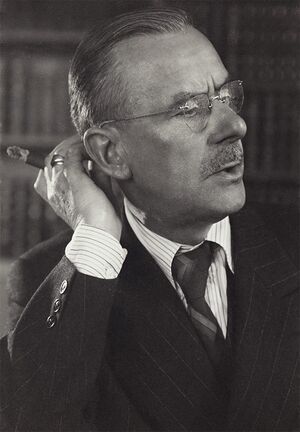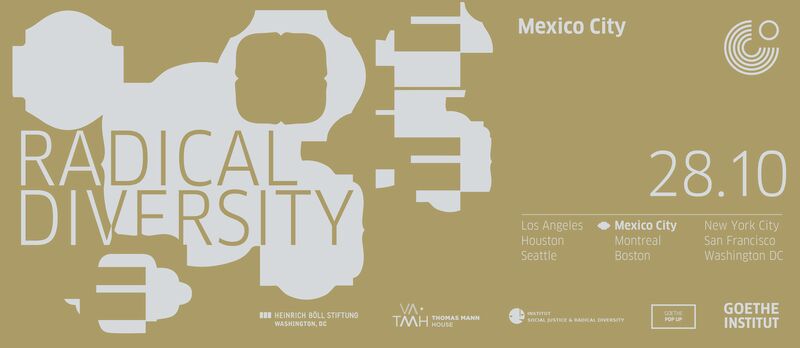Thomas Mann House Events Archive
October 2020
Exhibition: Thomas Mann »DEMOCRACY WILL WIN!«
Stiftung Buch-, Medien- und Literaturhaus München (Salvatorplatz 1, 80333 München)

Information
»Es ist mit der Selbstverständlichkeit der Demokratie in aller Welt eine zweifelhafte Sache geworden. Es ist die Stunde gekommen […] für eine Selbstbesinnung der Demokratie, für ihre Wiedererinnerung, Wiedererörterung und Bewußtmachung – mit einem Wort: für ihre Erneuerung im Gedanken und im Gefühl.« - THOMAS MANN: VOM ZUKÜNFTIGEN SIEG DER DEMOKRATIE, 1938
We are currently seeing the fundamental values of democracy being called into question. Populism and nationalism are placing democratic societies under massive pressure. The exhibition " Thomas Mann: Democracy will win!" of the Literaturhaus München represents a concrete contribution to the current debate about our democracy. It is intended to contribute to its "recollection, reconsideration and reawakening", to the "renewal of democracy in thought and feeling".
*Euro 7.- / 5.-
STUDENT SPECIAL: On Mondays students pay only 2 Euros
Partners
A cooperation with LITERATURHAUS MÜNCHEN. Supported by the German Federal Foreign Office.
One Nation – Many Stories: 30 Years of German Unity. A Virtual Panel Discussion
Online

Information

October 3, 2020 marks the 30th anniversary of German unification. The period between the fall of the Wall in November 1989 and the signing of the Unification Treaty on October 3, 1990 stands for German political ingenuity in reclaiming a unified nation. At the same time, we need to acknowledge that Willy Brandt’s dictum “Now what belongs together will grow together” has been only partially realized. While formal unification took barely a year, it turns out that unity takes generations.
Continuing differences in living standards, pensions, political orientations or democratic values indicate that the process of unifying former East and West Germany is a multi-generational project. In what ways do perceived political, socio-economic, and cultural differences impact how Germans of the old and new Länder see and participate in their country? Have Germans dealt adequately with their separate pasts in order to craft a joint 21st-century political identity? While there is much to celebrate, what is at stake during the next decade of ‘unifying work’? These and other questions will be discussed with three distinguished experts on German politics, society, and culture.
This virtual event will be moderated by Niko Switek, DAAD Visiting Assistant Professor for German Studies at the Henry M. Jackson School of International Studies and the Department of Political Science at the University of Washington.
Event is free and open to the public. Registration is required. Please use the link to register via the webpage of the Goethe Pop Up Seattle.
Participants
Marianne Birthler was the spokesperson for the Alliance90/Green Party and from 2000 to 2011 she served as the Federal Commissioner for the Stasi Records, where she was responsible for investigating the past crimes of the Stasi, the former East German secret police. In 2014, Birthler published Halbes Land. Ganzes Lan. Ganzes Leben. Memories, that tell of everyday GDR life – stories out of school and out of resistance. Marianne Birthler is a member of the Green Academy of the Heinrich Böll Foundation and holds several honorary offices and functions: She is a member of the Board of Trustees of the Körber Foundation, the Advisory Board of the Berlin Wall Memorial, the Board of Trustees of the Freiherr-vom-Stein Prize for Social Innovation, and the Board of the Aktion Courage - to name just a few.
Joyce Marie Mushaben recently retired as a Curators’ Distinguished Professor of Comparative Politics at the University of Missouri-St. Louis, where she also served as Director of the Institute for Women's & Gender Studies (2002-2005). She is now an Adjunct Professor in the BMW Center for German & European Studies at Georgetown University and works with Gender5 Plus, an EU feminist think-tank. Beyond her time as a Visiting Scholar in Tübingen, she has taught at universities in Berlin, Stuttgart, Frankfurt/Main, Erfurt, and has been a Humboldt Foundation Fellow. Her early work focused on German national identity, new social movements, and generational change. More recently, she has worked on EU citizenship and migration policies, women’s leadership, Euro-Islam debates, and comparative welfare state reforms. Her latest books include Gendering the European Union: New Responses to Old Democratic Deficits (with Gabriele Abels); and Becoming Madam Chancellor: Angela Merkel and the Berlin Republic (Cambridge University Press, 2017). She currently works on a book manuscript titled The Dialectical Identity of Eastern Germans: Re-assessing the Forces of Exit, Voice and Loyalty.
Michael Zürn is Director of the research unit Global Governance at WZB Berlin Social Science Center and Professor of International Relations at Free University Berlin. Since 2019, he has been the spokesperson of the Cluster of Excellence “Contestations of the Liberal Script” (SCRIPTS), funded by the German Research Foundation. His work focuses on the emergence and functioning of inter- and supranational institutions and organizations as well as on their impact on the global political order. He is a member of the Berlin-Brandenburg Academy of Sciences and Humanities and, since 2014, member of the Academia Europaea. From 2004 to 2010, he served as Founding Rector of the Hertie School of Governance. At the University of Bremen, he held positions as Professor of International Relations and Director of the Institute for Intercultural and International Studies. Michael Zürn is a 2021 Thomas Mann House fellow.
Partners
The event is co-organized by the Center for West European Studies (CWES) at the Henry M. Jackson School of International studies at UW and the Goethe Pop Up Seattle. It is sponsored by the Department of Germanics at UW and the Germany Embassy to the U.S. It is supported by the Department of Germanics (UW), the Center for Global Studies (UW), the Ellison Center for Russian, East European and Central Asian Studies (UW) and the Thomas Mann House.
Radical Diversity: Discussion Series with Mohamed Amjahid and Max Czollek (Mexico City)
Online

Information

Mohamed Amjahid and Max Czollek will engage in a conversation with guests in the U.S. about strategies for a more open, diverse and just society in Germany and the U.S. Thomas Mann Fellow and author Mohamed Amjahid and poet and publicist Max Czollek talk about political activism and diversity. In their work, they discuss the politics of history in the discourse on integration in both countries and raise the question: How is social diversity expressed in politics and art in both countries? What are counter-concepts to white, hegemonic culture?
The next episode will take place in Mexico City on October 28, where Max Czollek will speak to three independent curators from Mexico City: Violeta Horcasitas, Clara Bolívar (Tlaxcala3) and Alí Cotero (Tlaxcala3). They will discuss the current state of critical curatorial practices, both within the context of the Mexican museum and outside it. They will also examine the structural and social “walls” one encounters in Mexico.
Live online webinar on October 28, 2020, 9 AM (PT). Please register here.
Participants
Max Czollek completed his doctorate studies at the Center for Research on Antisemitism at the Technical University Berlin. Since 2009, Czollek has been a member of poetry collective G13, which has published books and organized lectures. In 2018, his essay Desintegriert Euch! (Disintegrate!) was published at Carl Hanser. His second essay, Gegenwartsbewältigung (Coping with the Present), was published in August 2020.
Violeta Horcasitas is an independent curator. Her professional interests include collaborative processes, online platforms and new exhibition formats. She founded Satélite, a curatorial initiative and platform that reflects on the institution of the museum. Through collaborations with artists and specialists from various fields, Satélite believes in the power of art and culture as a means to create new forms of interaction in social space, to identify challenges, to propose alternatives, and to support participation from the public and society. With more than fifteen years of professional experience in the public, private and academic sectors, she has worked for various museums and institutions including Fundación Jumex, La Tallera, Museo del Palacio de Bellas Artes, and Instituto Nacional de Bellas Artes in Mexico. She is currently working on the 2020-2021 curatorial program for Casa del Lago UNAM.
Clara Bolívar is a researcher and curator of modern and contemporary art, which she approaches from the standpoint of historiography and cultural mediation. She has worked as a researcher at Museo Nacional de Arte – INBA and at Museo Universitario Arte Contemporáneo – UNAM. She currently oversees discussion rounds on art that are held with independent organizations such as Tertulia, Tlaxcala3 and GCAS – Latin America.
Alí Cotero is a cultural manager, researcher and communication scholar at the Universidad de la Comunicación (University of Communication). He has worked as a placement, production and management coordinator in the private and public sectors for Museo Nacional del Virreinato INAH and Museo Jumex Arte Contemporáneo as well as for cultural festivals such as Festival Internacional Cervantino INBA and Festival del Centro Histórico México. He helped launch and promote the cultural program at Casa Vecina, a cultural institution that is part of the Fundación del Centro Histórico de la Ciudad de México, AC (Mexico City Historical Center Foundation). Since 2018, he and Clara Bolívar have run Tlaxcala3, an independent space for reflection on contemporary art.
Partners
"Radical Diversity" is presented by the Goethe Institutes in North America in cooperation with Thomas Mann House, the Institute for Social Justice & Radical Diversity, funded by the Heinrich Böll Foundation North America.








